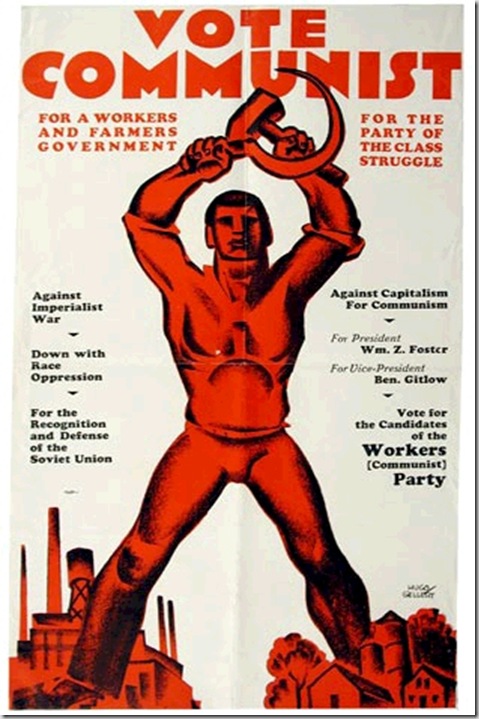The Communist Party of the United States (CPUSA) is the most prominent communist political party in American history, though its influence has been minimal since the early days of the cold war. In 1919 Vladimir Lenin himself invited the communist faction of the Socialist Party to join the Comintern.
Many of the Socialist Party members who broke away and formed CPUSA in response to Lenin's invitation belonged to groups of European immigrants in the United States, bound by a common language and a commitment to socialism. A number of delegates expelled from the Socialist Party convention formed a separate communist party, the Communist Labor Party, but by 1921—at the order of the Comintern— these two parties merged.
After the Russian Revolution and other socialist victories around the world, the United States was coming under the grips of the Red Scare. Many communist groups were explicit about their aims to overthrow existing institutions at the expense of those benefitting from or protected by those institutions.
  |
Racial and nationalist issues sometimes played into this anticommunist paranoia; many American communists were part of the waves of eastern European immigration that ended the 19th century—and a significant number of them were Jewish. CPUSA was predominantly eastern European and Jewish and found itself the target of anticommunist and antiSemitic literature.
The late 1920s saw conflicts with Joseph Stalin, who regarded the success of CPUSA as entirely dependent on its followers' belief that the party was a link to the Comintern and who considered the party dangerously out of step with Soviet communism.
 |
| Communist America's poster |
CPUSA's goals in the period following this shift were focused principally on labor issues and civil rights, especially after the Great Depression increased the ranks of the working poor and made union issues even more critical. Though antifascist, CPUSA opposed military action against Hitler's Germany until the invasion of the Soviet Union.
In the aftermath of World War II, CPUSA became even more suspect than it had been during the Red Scare, with membership or attendance at one of its meetings grounds for suspicion, firing, and blacklisting.
The party continued to support the Civil Rights movements and allied itself with many leftist and liberal political movements throughout the 1950s and 1960s, many of which distanced themselves in response. Over the decades since World War II, this reluctance on the part of liberal interests to ally themselves with the Communist Party has led to a decrease in the party's influence.
   |
Various revelations in the aftermath of the cold war have confirmed that at various periods the Soviet Union supported CPUSA financially, hoping that its survival would weaken the United States from within.
In the early days of the cold war, there were several cases of American communists passing secrets to the Soviets, including details related to the design of the atomic bomb. But despite the fears of the McCarthyists and the hopes of the Soviets, CPUSA appears to have had little impact on the American infrastructure.
